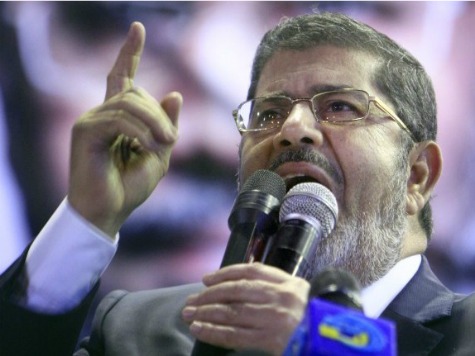
When declaring a state of emergency in the canal cities in response to clashes in Port Said last week, President Morsi finally showed Egyptians his “bad cop” side after months of “good cop” rhetoric filled with invocations of “hugs” and “love.” What quickly became viral from the announcement was the clip of the President holding up his finger and wagging it at the Egyptian people, warning them that there would be dire consequences for their lack of cooperation. On Twitter and Facebook, activists mocked the President’s finger and the sudden change in tone.
Although admittedly humorous considering the seriousness of challenges that Egypt now faces, Morsi’s finger-wagging is indicative of a worrisome trend for the lack of respect for dignity in a post-revolution Egypt across its state institutions. Morsi’s finger brings to mind memories of age-old, paternalistic speeches by former President Mubarak, who would often condescendingly refer to his citizens as children. Morsi’s tone indicates a leaning towards the notion that the President is entitled to raise his children and punish them when they misbehave. More importantly, it indicates that the President is of a different caliber than his people and “deserves” the position which he occupies. When the President embraces a tone like this, it empowers his Prime Minister, cabinet officials, and security forces to do the same. In fact, in a recent Twitter announcement, President Morsi gave security forces an-almost carte blanche to do whatever necessary to contain the violence.
This sense of entitlement becomes painfully clear with the most recent incident of the abuse of 50-year old Hamada Saber. Saber was stripped, beaten, and dragged by Central Security Forces (CSF) on live television. He initially claimed that police were helping him after protesters had abused him. Shortly after being transferred to a public hospital however, he admitted that he had been pressured to change his account and ultimately recognized the guilt of the police in the horrifying incident. The sense of empowerment that young CSF forces have and the protection they are guaranteed, as well as the entitlement that high-level members of the Ministry of Interior have in influencing citizen testimony come together to create a false dichotomy between state institutions and citizens in a manner that only proliferates this problem. With very few officers and security forces brought to justice since the revolution, it is only reasonable to think that Saber’s incident is one of many that happen behind closed doors.
Related to this, are the increasingly worrisome accounts of torture in police stations. In November, 25-year old Saad Saeed was found dead after being tortured and abused at the Giza Police Station; his face was left disfigured and it was hours before his family was notified to come pick up their son’s body. Despite initial denials by police, medical reports have recently confirmed extensive bruising and abrasions to his body, both indicative of torture. While Major Hisham Abdel Gawwad has clearly been implicated in the event, investigations have not ensued and the Major enjoys the protection of his position.
More recent is news of the alleged torture of 28-year old Mohamed El-Gendy, a member of the Popular Current, who was arrested by police after protesting on January 27. He was transferred to intensive care after suffering from a suspected brain hemorrhage and brain effusion, both believed to be products of torture while in police custody. El-Gendy and Saeed are not alone; there have been at least 150 documented incidents of citizens dying or seriously suffering from police brutality since President Morsi took power last June. In fact, according to El Nadeem Center for Rehabilitation of Victims of Violence, in Morsi’s first 100 days as President, there were 88 torture cases, 34 of which ended in the death of the citizen.
Without a concerted effort to hold those accountable, incidents like this will only increase. President Morsi’s comment on the Saber case does not help. While his office stated that the President deplored the incident, it was also described as an “isolated act.” Such rhetoric indicates that the President is not at all serious about purging the Interior Ministry (one of the largest sources of entitlement in the current Egyptian state) and bringing justice to those who have seen their human dignity squandered.
Outside of the realm of torture and citizen abuse, the lack of respect for human dignity manifests itself in almost every aspect of society; whether the rhetoric directed towards protesters (who are often falsely labeled by government officials as “thugs” without real political demands); the arrest of young children (including a 14-year old bone cancer patient who was forced to miss his chemotherapy session); and the lack of social services towards those who cannot provide for their families, among other things.
Ultimately, it is the responsibility of the President and those in the highest levels of office to set the tone for the nation. Although the incident of the President’s finger-wagging may be minor and humorous; it personifies an attitude which cannot be left to color Egypt in the post-revolutionary context. When the commander-in-chief refers to his citizens in a patronizing manner which alludes to their incapacity to make decisions on their own, have independent political opinions, and question authority, this is bound to give surrounding political and official actors, whether Muslim Brotherhood party members or CSF forces the green light to view citizens in the same way. This lack of equity between the state and its people was at the heart of the failure of the Mubarak regime and at the heart of the demands of the January 25 Revolution. If President Morsi does not make a concerted effort to treat the Egyptian people with the respect and human dignity they deserve, he will only hasten the digging of his and his party’s own graves.
Mai El-Sadany is a law student at the Georgetown University Law Center, with an intent to focus on international and human rights law in the context of Middle East politics.
Photo: AP
Image: Morsi%20Speech.jpg
